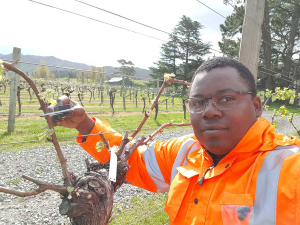Now, 15 years after the agronomist put his Bachelor degree to work at the African Research Centre for Bananas and Plantains, Paul is helping New Zealand’s wine industry utilise artificial intelligence (AI) to address labour issues.
His PhD doctorate - Modelling grapevine canopy and analysing pruning intensity effects on cane pruning determinants, canopy structure and vine balance - is part of the larger five-year programme MaaraTech or Human Assist, funded by the Ministry of Business, Innovation and Employment’s Endeavour Fund, with the goal of researching and developing technologies that help manual labour in orchards and vineyards in unique ways.
The programme intends to develop novel AI technologies, supportive means and then robots, which will assist workers in horticulture and viticulture, including through winter grapevine pruning, by supporting inexperienced human pruners and autonomous pruning machines, says Paul. The AI system will learn from expert pruners and make pruning decisions by sensing the grapevine canopy.
His work provides the input for the AI-logic, by exploring the multiple relationships between dormant shoot weight and canopy metrics to accurately estimate pruning weight and leaf area. He also intends to quantify and model retained cane attributes, pruning criteria and pruning decisions on grapevines displaying morphological variability. The work will investigate the effects of pruning intensity on grapevine growth, fruit composition, balance and dormant shoot attributes.
The ultimate goal of Paul’s work is an autonomous robotic pruner. However, the data he collects, and the statistical model built from it, will initially inform augmented reality tools (with technologies like Hololens, for example) through which an inexperienced pruner can be assisted by AI technology when looking at a specific vine. Advice on the best pruning decisions in the vineyard might be given audibly, through a loudspeaker or earpiece, or visually, perhaps through a light pointer directing the worker to the correct spur or shoot, says Paul. In this way augmented reality, informed by AI, will support staff in the vineyard, raising productivity and consistency of manual pruning work.
Paul’s research programme - Modelling grapevine canopy and analysing pruning intensity effects on cane pruning determinants, canopy structure and vine balance is supervised by Armin Werner of Lincoln Agritech, and Amber Parker, Peter Almond, Olaf Schelezki and Rainer Hofmann, all of Lincoln University. MaaraTech or Human Assist is a research collaboration between University of Auckland (lead), University of Waikato, University of Canterbury, University of Otago, Lincoln Agritech, and Plant & Food Research, funded by the Ministry of Business, Innovation and Employment’s Endeavour Fund. New Zealand fruit industries and equipment manufacturers are also supporting the project.



